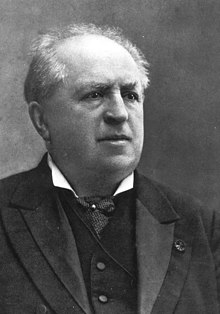Abraham Kuyper | |
|---|---|
 Kuyper in 1905 | |
| Prime Minister of the Netherlands | |
| In office 1 August 1901 – 17 August 1905 | |
| Monarch | Wilhelmina |
| Preceded by | Nicolaas Pierson |
| Succeeded by | Theo de Meester |
| Member of the Senate | |
| In office 16 September 1913 – 22 September 1920 | |
| Parliamentary group | Anti-Revolutionary Party |
| Minister of the Interior | |
| In office 1 August 1901 – 17 August 1905 | |
| Prime Minister | Himself |
| Preceded by | Hendrik Goeman Borgesius |
| Succeeded by | Pieter Rink |
| Parliamentary leader in the House of Representatives | |
| In office 13 November 1908 – 18 September 1912 | |
| Preceded by | Jan Hendrik de Waal Malefijt |
| Succeeded by | Gerrit Middelberg |
| In office 16 September 1896 – 1 August 1901 | |
| Preceded by | Jan van Alphen |
| Succeeded by | Jan van Alphen |
| In office 20 May 1894 – 1 July 1894 | |
| Preceded by | Office established |
| Succeeded by | Jan van Alphen |
| Leader of the Anti-Revolutionary Party | |
| In office 3 April 1879 – 31 March 1920 | |
| Preceded by | Office established |
| Succeeded by | Hendrikus Colijn |
| Chairman of the Anti-Revolutionary Party | |
| In office 12 February 1907 – 31 March 1920 | |
| Leader | Himself |
| Preceded by | Herman Bavinck |
| Succeeded by | Hendrikus Colijn |
| In office 3 April 1879 – 17 August 1905 | |
| Leader | Himself |
| Preceded by | Office established |
| Succeeded by | Herman Bavinck |
| Member of the House of Representatives | |
| In office 13 November 1908 – 18 September 1912 | |
| In office 16 May 1894 – 31 July 1901 | |
| In office 20 March 1874 – 1 June 1877 | |
| Personal details | |
| Born | Abraham Kuyper 29 October 1837 Maassluis, Netherlands |
| Died | 8 November 1920 (aged 83) The Hague, Netherlands |
| Political party | Anti-Revolutionary Party (from 1879) |
| Spouse |
Johanna Hendrika Schaay
(m. 1863; died 1899) |
| Children | Herman Kuyper (1864–1945) Jan Kuyper (1866–1933) Henriëtte Kuyper (1870–1933) Abraham Kuyper Jr. (1872–1941) Johanna Kuyper (1875–1948) Catharina Kuyper (1876–1955) Guillaume Kuyper (1878–1941) Levinus Kuyper (1882–1892) |
| Alma mater | Leiden University |
| Occupation | Politician · Minister · Theologian · Historian · Journalist · Author · Academic administrator · Professor |
| Signature | |
Abraham Kuyper (/ˈkaɪpər/ KY-pər, Dutch: [ˈaːbraːɦɑm ˈkœypər]; 29 October 1837 – 8 November 1920)[1] was the Prime Minister of the Netherlands between 1901 and 1905, an influential neo-Calvinist pastor and a journalist. He established the Reformed Churches in the Netherlands, which upon its foundation became the second largest Reformed denomination in the country behind the state-supported Dutch Reformed Church.
In addition, he founded the Vrije Universiteit Amsterdam, the Anti-Revolutionary Party, and a newspaper. In religious affairs, he sought to adapt the Dutch Reformed Church to challenges posed by the loss of state financial aid and by increasing religious pluralism in the wake of splits that the church had undergone in the 19th century, rising Dutch nationalism, and the Arminian religious revivals of his day which denied predestination.[2] He vigorously denounced modernism in theology as a fad that would pass away. In politics, he dominated the Anti-Revolutionary Party (ARP) from its founding in 1879 to his death in 1920. He promoted pillarisation, the social expression of the anti-thesis in public life, whereby Protestant, Catholic and secular elements each had their own independent schools, universities and social organisations.